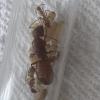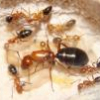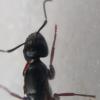My Myrmica's tube shattered during their mini-hibernation, and a large portion of their egg cluster and one worker was drowned. Thankfully, the other four workers, the queen, and most of the brood survived.
Wow, how did it shatter???

My Myrmica's tube shattered during their mini-hibernation, and a large portion of their egg cluster and one worker was drowned. Thankfully, the other four workers, the queen, and most of the brood survived.
Wow, how did it shatter???
Just saw in the weather forecast, Fri forecast to be upper 60s, Sat in the mid-70s. There's a chance this could trigger a P. imparis flight in parts of the Northeast!
Last year I caught lasius species, I am pretty sure they are flavus, but anyways I read that they lay eggs after hibernation. A few queens that I caught have survived hibernation and I was wondering if any of you know when they would start laying eggs if they are fertile. @noebl1 your right P. imparis might fly!
Last year I caught lasius species, I am pretty sure they are flavus, but anyways I read that they lay eggs after hibernation. A few queens that I caught have survived hibernation and I was wondering if any of you know when they would start laying eggs if they are fertile. @noebl1 your right P. imparis might fly!
I found they took 1-4 weeks post hibernation to start laying, however, not impossible to go a bit longer. I took a look at the queens I took out in the beginning of March over the weekend, and I think all of them have laid by this point. Like normal, had about a 15-20% death rate on the new Lasius queens during hibernation.
This Fall I saw a subterranean Lasius flying; either L. nearcticus or maybe L. umbratus? They queens looked to have smaller gasters, hence thinking may be a parasitic Lasius. However they were a very amazing looking yellow/orange and noticeably larger than the average Lasius.
ARGH, looks like I jinxed it for Sat, now low 60s ![]() Guess we'll be waiting a bit longer.
Guess we'll be waiting a bit longer.
@RodyAnts sorry to hear about your ants. Tetramorium are really easy, and other than a fluke death of one of my queens, they're really flexible. Also if you know anyone with a pool, they are super easy to find in June/July. Camponotus fly towards the end of May typically, but I've had horrible luck with them (other's seem to have much better luck). I am hoping I may see C. americanus this year as they have a great color, and I know I have local colonies as see the workers. Previous year I caught 2 alates and gave them to another member, and last year didn't see a single one. It's hard to spot them as if they fly with the other Camponotus around here, it's literally a needle in a haystack to find one. The two I found I got lucky as found them digging their founding burrows, so easy to spot.
Any other RI members? May be able to get a Lasius queen from another member; they are also rock solid once they start to lay (well besides L. alienus for me as I have terrible luck with those.) I live in MA or I'd give you one, sorry ![]()
I wouldn't mind donating a lasius queen, however I only have two and I am not sure if one of them is fertile.
I was catching Tetramorium queens that were caught in the condensation of cars. In the mornings, you would drive down the street and see vehicles peppered with black queens stuck to them.
Ants are out earlier than I thought. It's a bit over 46F today, and saw Lasius, Tetramorium and even a Camponotus americanus worker out foraging.
It went to 70 F yesterday. Do you think P. imparis flew?
Giant Prenolepis imparis flight in Ct today!!! Just caught a whole bunch of queens.
Hit 70F yesterday in MA here too, but didn't see anything flying. Too cold today in the upper 40s/low 50s.
Great news @ctantkeeper!
it got to the 60s here but to windy
I just found my first Prenolepis imparis queen!
I also found two Lasius umbratus, and my Lasius neoniger queen finally has larvae!
Also, for those who are interested, I saw seven Polistes fuscatus queens, three Vespula germanica queens, and one Dolichovespula maculata queen drinking some sap. If you want to raise wasps, now is the best time to catch some!
My Myrmica's tube shattered during their mini-hibernation, and a large portion of their egg cluster and one worker was drowned. Thankfully, the other four workers, the queen, and most of the brood survived.
Wow, how did it shatter???
The tube froze and shattered from the pressure.
Spotted the first wasps and bees of the season here, and sitting around 50F. I see next week in the 60Fs as well, *could* have P. imparis flights as pretty late this year, but not sure if still too cold.
There's been mosquito like insects flying here the last couple weeks I've been catching huge numbers of, and freezing. Ants have been devouring them. A slight change from the fruit flies and meal worms and a bit early in the season for people here to start spraying poison for mosquitoes.
My Tetramorium colony has a *huge* brood pile, going to be a population explosion soon. Aphaenogaster picea about to have yet another batch eclosing too; very excited as they have been having one eclose every week or so now.
Great news! My "control" colony of Reticulitermes has its first alates! If you want to keep termites, keep an eye out for pairs in a week or so!
Great news! My "control" colony of Reticulitermes has its first alates! If you want to keep termites, keep an eye out for pairs in a week or so!
I've never seen pair, but solo alates. In prior years I hadn't thought to grab the alates for ant food, however thinking they are pretty high nutrient-wise and may be worth snagging. Not sure I want to get a colony of them going.
Noticed my Temnothorax colonies aren't taking any nectar or even honey anymore, and devouring protein like crazy. They also ejected one of the queens, and she's been foraging/eating one of the flies I put in.
Edited by noebl1, April 18 2018 - 3:31 PM.
Just starting to get some worker foraging activity here in Southern Maine. Took the trash out this morning to discover the formica colony on the side of our house where out and about and then stumbled upon a Formica fusca queen wondering around in a confused state. She must have been from a late flight last year. Since most of my Formica queens had perished during hibernation I did catch her and hope she lays some eggs for me. ![]()
Just starting to get some worker foraging activity here in Southern Maine. Took the trash out this morning to discover the formica colony on the side of our house where out and about and then stumbled upon a Formica fusca queen wondering around in a confused state. She must have been from a late flight last year. Since most of my Formica queens had perished during hibernation I did catch her and hope she lays some eggs for me.
Could also be a colony ejection for some reason? I saw a Formica worker yesterday too, and Lasius are quite busy digging out from the winter. Tetramorium are visible under a couple of rocks close to surface that I know about. Really excited about the next couple days hitting close to 70 here. Spring may finally be here... Hard to believe May is a little over a week away. Desperately been keeping an eye out for Myrmica queens foraging. Hoping now that I WFH on Wednesdays, may have more of a chance to find stuff than previous years.
Finally made the decision to keep my native pitcher plants (Sarracenia purpurea) outside for the season ![]()
Ants & Myrmecology →
General →
Want to connect with other ant keepers in MaineStarted by Naturenut1233 , Mar 29 2024 |
|

|
||
Market Place →
General Market Place →
Ottercl's Ant Shop (Massachusetts)Started by Ottercl , Aug 4 2023 |
|

|
||
Anting →
Ant ID Requests →
Can anyone identify which ant this is?Started by KodexFB , Sep 26 2022 |
|

|
||
Ant Keeping →
General Ant Keeping →
Can anyone identify which ant this is?Started by KodexFB , Sep 26 2022 |
|

|
||
Market Place →
General Market Place →
Looking to buy Queens/Already built colony's in CTStarted by OliverO , Nov 11 2021 |
|

|
0 members, 1 guests, 0 anonymous users